By Joe Cash
BEIJING (Reuters) - Plans by China's Communist Party to revive a high-level economic watchdog after two decades signal President Xi Jinping push to increase oversight of the financial sector, analysts say, part of a wider tightening of control by Xi and the party.
Xi, who secured a precedent-breaking third leadership term in October, is planning to resurrect the Central Financial Work Commission (CFWC), which will be directly under central party leadership, two people briefed on the matter told Reuters.
A decision to revive the commission may be revealed following the annual gathering of the National People's Congress (NPC), the people said. The NPC, to begin its session on Sunday, is set to confirm a new slate of economic leaders chosen by Xi.
The State Council Information Office did not immediately respond to a request for comment.
The CFWC was introduced in 1998 during the tenure of Jiang Zemin, building a role for the party within the central bank and financial regulators but without influencing their business, state media reported at the time. It was disbanded in 2003.
"If the CFWC is indeed revived, it will hold strong influence over the financial system, including making personnel appointments in key positions," said Xin Sun, senior lecturer in Chinese and East Asian Business at King's College London.
"Through the CFWC, Xi and his allies could more rapidly roll out a reshuffle to replace the remaining legacy technocrats with people more loyal to them," he said.
The CFWC would be headed by a member of China's elite seven-member Politburo Standing Committee, the two sources said, with incoming premier Li Qiang or Ding Xuexiang the leading contenders, one of them said.
China's financial sector is overseen by the People's Bank of China (PBOC), the China Banking and Insurance Regulatory Commission, the China Securities Regulatory Commission, with the cabinet's Financial Stability and Development Committee at the top.
All are government bodies, as opposed to party organisations.
Under the new proposed structure, the party would take on a direction-setting role for the economy and regulatory bodies.
"The situation is vastly different to when the CFWC was set up the first time," according to Xu Tianchen, economist at the Economist Intelligence Unit.
CHECKS AND BALANCES?
During Jiang's era, state media spoke of a need to ensure a separation between the responsibilities of the party and those of government and business. Under Xi, the party's role is much more pervasive.
"Overall, the top leadership is not very satisfied with the situation in the financial sector, and the problem is related to the political stance among the state-owned financial institutions," said Xu, pointing to what he said was frustration among senior party officials that their directives are not properly implemented.
Analysts said the PBOC could lose more of its already limited independence if the CFWC was brought back with a remit that included determining the direction of economic policy.
"Xi throughout wants centralised, vertical power through Party committees that directly report to him," said Alfred Wu, associate professor at the Lee Kwan Yew School of Public Policy at the National University of Singapore.
"The problem is, we don't know whether the CFWC will have any checks and balances," he said.
Iris Pang, chief economist for Greater China at ING, said the CFWC could be a better way to monitor financial system risks emerging from industries such as real estate.

"But this could also lead to policies replacing some market forces, which may not be ideal for financial liberalisation", she said.
(This story has been corrected to fix the spelling of Xin Sun's name in paragraph 6)